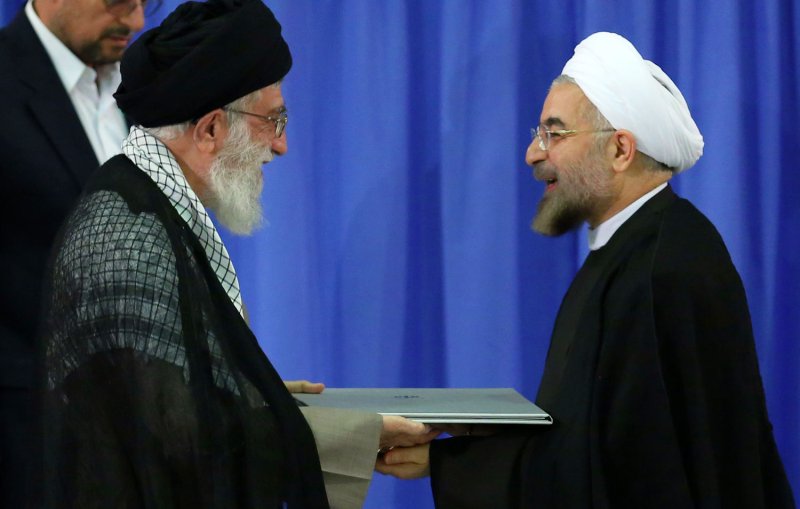This picture made available by Iran's supreme leader website shows Iran's supreme leader Ayatollah Khamenei (L) giving the endorsement letter to Iran's new president Hassan Rouhani during a ceremony for Rouhani's confirmation as Iran's new president in Tehran, Iran on August 3, 2013. UPI/Leader.ir/HO |
License Photo
TEHRAN, Jan. 9 (UPI) -- Talks on Iran's nuclear program expose the U.S. government's animosity for the republic, Islamic Revolution leader Ayatollah Seyyed Ali Khamenei said Thursday.
"One of the blessings of the negotiations was that the animosity of American officials toward Iran, Iranians, Islam and Muslims was revealed to everyone," Khamenei said in Qom.
Khamenei said leaders have announced that Iran will, on some issues, "negotiate with this Satan in order to ward off its evil," Press TV reported.
Khamenei also rejected the idea that Iran was forced to enter into negotiations with six western powers because of economic sanctions.
On Wednesday, Iranian Deputy Foreign Minister for European and American Affairs Majid Takht Ravanchi said Tehran and negotiators from the P5+1 group -- China, Russia, Great Britain, France, the United States and Germany -- reached a "basic consensus" to begin implementing a nuclear deal reached in Geneva, Switzerland, as soon as Jan. 20, Tasnim News Agency said.
While Jan. 20 is the date the two sides have agreed upon, Takht said an agreement on an exact date for implementing the Geneva accord will be finalized after a meeting between Iranian Deputy Foreign Minister for Legal and International Affairs Seyed Abbas Araqchi and Helga Schmid, the European Union's deputy foreign policy official.
In November, Iran and the P5+1 signed a six-month agreement on Tehran's nuclear program.
The world powers agreed to suspend some non-essential sanctions and not impose new nuclear-related bans in exchange for Tehran's decision to freeze parts of its nuclear activities and allow more inspection of its nuclear facilities. The agreement is to help create breathing room for a more comprehensive agreement.
Earlier this week, a senior Iranian judiciary official reiterated his country's opposition to nuclear weapons, saying Khamenei's fatwa on prohibiting nuclear arms precedes any political or diplomatic consideration, Tasnim reported.
Mohammad Javiad Larijani, secretary general of Iran's High Council for Human Rights, said Tehran never sought nuclear weapons, saying the country already has security and military might that may not increase with nuclear weapons.
Larijani spoke about Iran's uranium enrichment program during a meeting with Andreas Schockenhoff, a German lawmaker.
Larijani said the fatwa -- or religious degree -- issued by Khamenei that prohibits nuclear weapons is more important than "diplomacy and the administration's policy." He said the decree was "the biggest deterrent factor" on possessing nuclear weapons.















